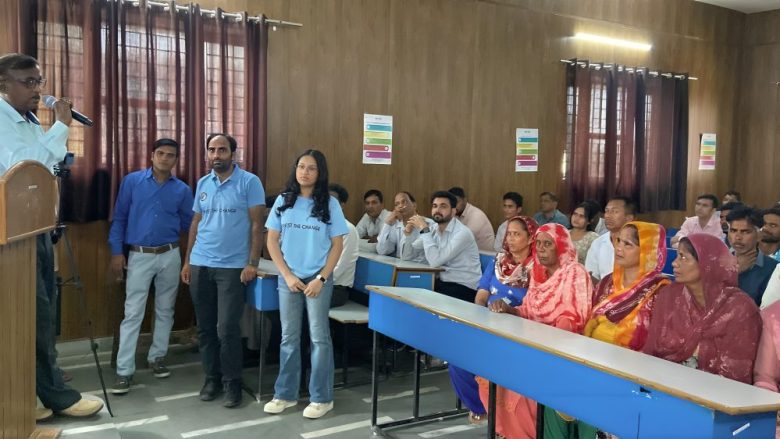
Delhi5:24 PM | 27th April 2024
Don't be afraid to take that first leap; although it might be intimidating, know that no effort to make a difference is ever wasted. Whether you're starting from scratch or aiming higher, if you are contributing positively to your community, no effort is too small or too large.


So, ever since I was young, I’ve always been very interested in economics, whether it was dinner table discussions with my parents or watching the news intently, trying to see if the arrow is red or green because that’s all I knew about the financial market until then. But I’ve always been very interested in the subject. As I grew older, whether it was through school or I enrolled myself in the Walton summer school program, I think I delved further into the field of finance and economics. Then around the end of 2020, during the pandemic, there was a housekeeping staff member in my society who had died in an accident, and his family was in immense financial distress after that because he was the sole breadwinner of his family, and they were already struggling a lot. When that happened, everybody in the society was crowdfunding to raise funds for the family. And I started doing further research, and I came across the fact that post-Covid, or during COVID especially, there had been a surge in medical emergencies that were leading to financial debt. And when I started looking for other feasible solutions for this problem, I came across insurance. And when you think of insurance, you primarily think of private insurance at first. But private insurance is such that it’s very expensive. So I started looking for other alternatives, and I came across a few government welfare schemes that were extremely affordable. And that’s how Invest the Change was born.

How does “Invest the Change” work towards promoting financial literacy among lower-income sections of society, and what kind of challenges did you face while setting up, and how did you overcome them? Any unique challenges you want to share?
Answer: Sure. Firstly, I’ll address what we do. Our main aim is to simplify and streamline access to government welfare schemes for beneficiaries from economically weaker sections. We focus on health insurance, life insurance, and accidental insurance as these are universally applicable and most beneficial to this demographic. We conduct sessions to make them aware of these schemes, gather basic information like name, phone number, and bank details, and later follow up to assist with the scheme acquisition process. We provide contact information for further assistance.
To address the challenges faced, one significant hurdle was the language barrier. I speak only English and Hindi, while many blue-collar workers, particularly migrant workers from West Bengal or Bihar, struggled to understand Hindi. Recognizing this, I recruited volunteers who spoke various languages like Tamil or Bengali to conduct sessions in languages better understood by the audience. This helped in facilitating effective communication.
Another challenge involved balancing my time between school studies and project commitments. To manage this, I prioritize tasks, use to-do lists and organizers, and delegate work to volunteers, thereby expanding our team. This approach has proven effective in overcoming time-related challenges.

Can you share some of the key milestones your startup has achieved since its inception?
Answer: Certainly. The first significant milestone was receiving the first call from a beneficiary confirming their acquisition of the scheme. This marked the initiation of our impact. The issuance of certificates from the bank, validating their enrollment, was a crucial proof of achievement.
Another noteworthy milestone was a conversation with a beneficiary during a post-follow-up. She expressed gratitude as her husband, employed in the injury-prone construction field, was ill and unable to work. The insurance coverage provided them with a sense of security, easing their anxiety about potential financial challenges in case of accidents or injuries. Additionally, Invest the Change received the Times of India Women Achievers award in the field of financial literacy. This recognition served as a significant achievement for our efforts.
Moreover, every interaction with beneficiaries, understanding their emotions, and witnessing the positive impact of the schemes on their lives are considered important milestones for us. Beyond numerical achievements, our focus remains on enhancing the lives of those we assist, making each positive change a noteworthy milestone for our project.

How has your father’s mentorship or family support shaped your entrepreneurial mind-set and interest in the financial world?
Answer: As I mentioned earlier, many dinner table conversations in my household revolved around the latest news and emerging technologies in the financial and economic sector, shaping the foundation for my study of economics and finance. This familial environment played a crucial role in cultivating my interest. Moreover, my parents have consistently supported my pursuits and endeavors. Given that my father works in the finance field, his expertise in investment decisions and familiarity with various financial instruments, as well as his ability to recognize patterns and potential solutions, has been invaluable.
Receiving mentorship and guidance from my father has been instrumental in understanding how to effectively convey information to our audience. Their support extends beyond mentorship, as they have assisted in prioritizing tasks, garnering more volunteers, and sustaining the project during busy periods, such as school and exams. Their involvement has been pivotal in not only shaping my entrepreneurial mindset but also in successfully progressing the project.

As a student, how has your academic background contributed to your understanding of economics and finance?
Answer: After 10th grade, when choosing my streams, I opted for commerce, focusing specifically on economics. Going deeper into the subject during 11th and 12th grade, along with participating in the Wharton Global Youth program during the summer of 2022, enhanced my understanding of economic concepts. Additionally, taking AP exams in macro and microeconomics further broadened my perspective on the factors influencing human decision-making.
In 2021, I conducted an independent research study on cryptocurrency, surveying Indians to gauge their receptivity towards the regulated cryptocurrency market. These experiences collectively deepened my insight into the intricacies of the Indian economic and financial markets. Understanding the diversity and unique needs of the Indian markets is crucial when addressing various challenges and developing solutions.


As a young entrepreneur, how do you balance your responsibilities at “Invest The Change” with your academic commitments? Can you share some strategies or routines that have helped you manage your time effectively?
Answer: It can be quite challenging at times, but what works for me is creating to-do lists and prioritizing tasks based on deadlines and importance. This ensures that I complete my work efficiently. I also schedule everything on my calendar weekly to avoid missing out on anything. Moreover, I constantly remind myself that no amount of work is wasted, even if it’s just a small step. Combining these strategies and the continuous reminder to keep going, I find the motivation to balance my responsibilities better. I’m still learning along the way, but these methods have been instrumental in my time management.

Everyone has a role model for anything that you go for or opt for. Who were your role models that have influenced you in this entrepreneurial journey? And how have their teachings shaped and approach towards your social entrepreneurship?
Answer: When I reflect on it, I don’t have a single, specific role model. I learn a lot from the people around me, drawing insights from different individuals. My interests are dynamic, and I find inspiration from various sources. While I can’t pinpoint one constant role model, my family, teachers, friends, and especially those in my immediate circle have been significant influences. For instance, my father’s meticulous work ethic and my mother’s understanding and empathy towards others have played a pivotal role. Growing up in a household that values respect, organization, and other virtues has shaped my values. Their influence motivates me to strive for personal growth and be a better individual.

What do you think will happen in social entrepreneurship in the next five years? And how does your ITC fit into this?
Answer: In the next few years, I foresee AI technology playing a significant role in driving social entrepreneurship, a trend already evident in various sectors. I believe there is ample room for the integration of technology in social entrepreneurship, and ITC aims to be at the forefront of this evolution.
Personally, our vision for ITC involves the fusion of education and entertainment to create animated, culturally tailored narratives. These could take the form of documentaries, short stories, podcasts, etc., focusing on financial literacy and education. I emphasize the importance of reaching audiences in a way that is both relatable and sustainable to effectively address disparities.
Combining AI with financial awareness and education holds substantial potential and is an area that I believe can be thoroughly explored. However, I acknowledge the need for balance, especially with the Indian population, where personal connections are highly valued for trust and security. Therefore, maintaining a balance between technology-driven solutions and human connections is crucial. ITC aims to make a difference by embracing technology while preserving the essential human touch, aligning itself with the evolving landscape of social entrepreneurship.
Watch the full interview here:

Your organization has done a lot of collaborations with government agencies, and government initiatives as well. So which one of your ITC’s collaborations with any organization that you think is the best for the organization?
Answer: Regarding collaborations, we primarily conduct sessions at various locations, including society complexes, schools, colleges, or any institution with large blue-collar workforces. We haven’t collaborated with any specific agency yet. However, during my internship at the management consulting firm Arthur D. Little, I developed a corporate toolkit. This toolkit guides companies on utilizing their corporate social responsibility (CSR) budget to support blue-collar workers, extending the principles of ITC. I believe this toolkit has substantial potential and could be significant for ITC. While we haven’t had traditional collaborations, the creation of this toolkit was particularly exciting for us. Nevertheless, we genuinely enjoy conducting sessions at every institution we visit.

What advice do you like to give to other young social entrepreneurs who are inspired by your work and want to make a difference in their own communities?
Answer: I believe the key advice I’d offer is that, initially, the idea of making a difference can be overwhelming. However, it’s crucial to recognize that every journey begins with a starting point, and there’s always room for growth. It’s perfectly fine to seek help and guidance along the way. Don’t be afraid to take that first leap; although it might be intimidating, know that no effort to make a difference is ever wasted. Whether you’re starting from scratch or aiming higher, if you are contributing positively to your community, no effort is too small or too large.
Copyright© educationpost.in 2024 All Rights Reserved.
